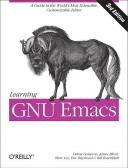Книга: Learning GNU Emacs, 3rd Edition
9.3.4 C++ Mode Differences
9.3.4 C++ Mode Differences
As we mentioned before, C++ mode uses the same Emacs Lisp package as C mode. When you're in C++ mode, Emacs understands C++ syntax, as opposed to C (or Objective-C) syntax. That results in differences in how some of the commands discussed here behave, but in ways that are not noticeable to the user.
There are few apparent differences between C++ and C mode. The most important is the Emacs Lisp code you need to put in your .emacs file to customize C++ mode: instead of c-mode-hook, you use c++-mode-hook. For example, if you want C++ mode's indentation style set to Stroustrup with automatic newlines instead of the default style, put the following in your .emacs file:
(add-hook 'c++-mode-hook
'(lambda ( )
(c-set-style "Stroustrup")
(c-toggle-auto-state)))
Notice that you can set hooks for C mode and C++ mode separately this way, so that if you program in both languages, you can set up separate indentation styles for each.
C++ mode provides an additional command: C-c : (for c-scope-operator). This command inserts the C++ double colon (::) scope operator. It's necessary because the colon (:) is normally bound to electric functionality that can reindent the line when you don't want that done. The scope operator can appear virtually anywhere in C++ code whereas the single colon usually denotes a case label, which requires special indentation. The C-c : command may seem somewhat clumsy, but it's a necessary workaround to a syntactic clash in the C++ language.
Finally, both C and C++ mode contain the commands c-forward-into-nomenclature and c-backward-into-nomenclature, which aren't bound to any keystrokes by default. These are like forward-word and backward-word, respectively, but they treat capital letters in the middle of words as if they were starting new words. For example, they treat ThisVariableName as if it were three separate words while the standard forward-word and backward-word commands treat it as one word. ThisTypeOfVariableName is a style used by C++ programmers, as opposed to this_type_of_variable_name, which is somehow more endemic to old-school C code.
C++ programmers may want to bind c-forward-into-nomenclature and c-backward-into-nomenclature to the keystrokes normally bound to the standard word motion commands. We show you how to do this in "Customizing Existing Modes" in Chapter 11.
We've covered the main features of C and C++ modes, but actually these modes include many more features, most of them quite obscure or intended only for hardcore Emacs Lisp-adept customizers. Look in the Emacs Lisp package cc-mode.el—and the ever-expanding list of cc- helper packages—for more details.
- Сравнение C# и C++
- 1.1.4. Model Explorer - навигатор модели
- IBPP для разработки C++
- Subscribing to C++ In Action
- Листинг 14.2. Использование параметра XMLWriteMode при сохранении объекта ADO.NET DataSet
- Entering and Exiting PHP Mode
- 3.4.2. The Transaction Model
- 17.2.2. Preemption Models
- 17.4.9. Runtime Control of Locking Mode
- 1.3.14 Sleep Mode
- 7.1.2 Operation of the SD Card in SPI Mode
- 9.9.1 Configuration Mode




